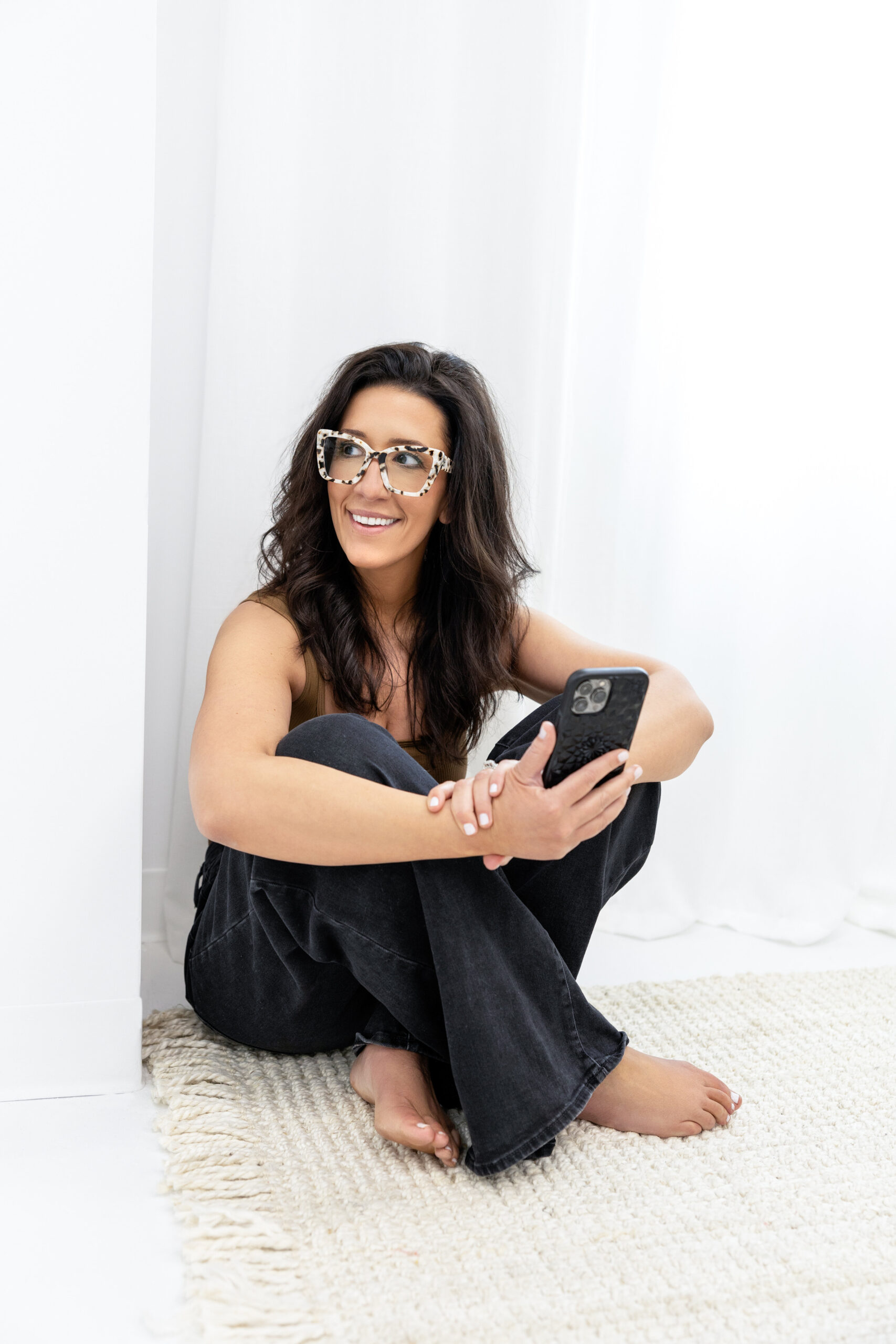August 15, 2025
How to Build Authentic Trust with Your Online Audience (Without the BS)
Podcast Episode: Building Trust Through Authenticity and Transparency behind a phone screen
Every time you want to make a message externally to your audience, no matter how big or small that is, think to yourself: Is this message going to further the transparency and trust I have with my audience, or is it going to further my wallet?
If it’s the latter, my challenge to you is to reconsider the messaging.
Building trust with authenticity and transparency is my favorite thing to talk about because I believe it’s the very thing that weaves together any successful business. And when I say successful business, I don’t just mean monetarily – I mean energetically, creating a community and an audience so loyal they would do anything to support you.
Why Authenticity Is Revolutionary (Sadly)
When I first started my digital products and affiliate marketing journey about a year and a half ago, I looked around at everyone else doing what I was doing and asked myself: “How do I stand out?”
You know what the only way I figured out how to stand out was? By just telling the truth and being transparent and authentic and bold.
It’s revolutionary – especially when you’re in a niche known for scammy bullshit. Real authenticity isn’t just refreshing online; it’s actually revolutionary, which is almost sad to think about.
We’re seeing so much “make money quick” messaging. So much “I can guarantee you this kind of transformation this quickly” bullshit. This reinforces the microwave society we’re in – everyone wants something to happen quick, right now, without putting in the work or effort.
The brands and businesses that never entertain that bullshit are the ones that will be here in five to ten years. They’re building legacies and communities with lifetime values in the millions.
The Authenticity Reality Check
Here’s where I struggle when I tell people to “be authentic” – a lot of people don’t even know what the fuck that means. They’ve been people pleasers their whole lives, never having figured their shit out, and now I’m telling them to go be themselves as business owners.
The filters you’re trying to put between yourself and your audience – that space between the message you actually want to say and the message you actually put out there – is creating distance that your audience can sniff out in a heartbeat.
The audience now, the buyers now, are way more educated, way more savvy, and way more cautious than ever before. For every perfectly scripted response, your audience sees right through that, and they don’t want it.
They actually want a real person:
- Someone who screws up
- Someone who doesn’t look perfect
- Someone who has a fucked up house
- Someone who learns and grows from mistakes
- Someone who isn’t afraid to show the messy middle
Vulnerability vs. Trauma Dumping
I struggle with the V word – vulnerability – because when people think they need to be vulnerable online, they think they have to trauma dump all over their audience. That’s simply not the case.
Vulnerability does not mean trauma dumping. Vulnerability means:
- “Hey, I fucked up, let’s talk about the lessons I’m learning”
- “I thought this was going to be a good decision, but actually this happened, and here’s what I learned”
- “I don’t feel like making content today, and here’s content about not feeling like making content today”
Vulnerability is creating relatedness between you and your audience. It’s not about sharing trauma or crying tears or showing weakness. If you’re committed to vulnerability, you’re committed to relatedness.
The Business Journey Reality
Here’s something nobody tells you: You think you’re in business to make money or create some kind of company. The joke’s on all of us because really, the biggest thing you’re doing is attempting to heal as an adult while simultaneously showing up as a leader that other people want to follow.
It’s this really crazy, complicated dance between healing yourself and building a business – and it’s an interesting thing to live through and watch.
3 Ways to Build Trust (Not Just Money) with Your Audience
1. Own Your Shit
If you made a mistake, admit it publicly. No excuses.
My income-sharing story: When I first started my digital product journey, I posted every night how much money I made that day. I was transparent about the work it took and what I actually did to make that money. I broke down each sale – this was from this product, this was affiliate commission, this is what I actually sell.
But about a year later, I learned you’re not technically allowed to do that on social media. Those dollar amounts, even though I was being honest, were creating an impression that “if I can, you can” – even though I verbally said otherwise.
When I learned this, I had to make a choice: continue doing what I was doing or step into following guidelines and find another way to market myself. Because I take leadership seriously and had a lot of eyes on my content, I had to admit publicly that the previous nine months of content wasn’t allowed.
Owning your shit makes you fucking human and trustworthy. The people who know better but do it anyway? Your audience knows they’re prioritizing their wallet over their integrity.
2. Stop Performing for People
Your brand isn’t a performance; it’s a conversation. When you approach your content this way, it takes the pressure off and makes you more relatable.
Your goal is to lessen the distance between you (the human on one side of the phone screen) and them (the human on the other side). When you’re performative, pretending to be someone else, it creates that gap even further.
Yes, there’s an element of performance required when you put a camera in front of you – that’s by definition performing. But there’s a difference between having a plan and trying to be someone you’re not.
You know exactly what it feels like when you’re faking it, when you’re trying to show up as someone you damn well know you’re not. Your audience knows too.
3. Be Consistent (In Who You Are)
Authenticity isn’t a costume you put on – it’s who you are everywhere.
My brother-in-law gave me the best compliment this summer. He said, “Vic, who people see in person is who you are on your phone screen. That’s wildly impressive because people don’t know that unless they’ve met you in person.”
Is your content congruent with who you are as a person? When I say be consistent, I don’t just mean post two to three times a day. I mean consistency in who you are as a person.
The No Apologies Approach
I know my audience doesn’t want perfection – they want real. And it’s in the real that I was able to build any semblance of an audience.
My audience wants to see:
- An entrepreneur struggling at 2 AM to finish a sales funnel
- A creator battling imposter syndrome every day
- Someone who doesn’t have all the answers but is brave enough to keep searching
This gives permission to your audience to just be fucking human.
My Shame Story (And Permission to Be Human)
I hired over $100,000 worth of coaches during my network marketing journey. One coach, Tracy Litt, changed the game for me because she gave me permission to just be human.
I carried so much shame from past decisions, failures, and childhood into my business. I used shame as a productive tool, thinking if I wasn’t shaming myself into production, I’d never be productive.
Tracy let me dump all my shit on her – bad decisions, traumas, everything – and simply gave me permission to be fucking human. She told me it didn’t mean anything about my worthiness, capabilities, or value.
That’s where my no apologies approach comes from.
Your Challenge: Drop the Mask
Drop whatever mask you feel like you have to wear right now. Drop whatever mask you think your audience wants from you because they don’t.
Being who you actually are online requires:
- An extraordinary amount of willingness to fail
- An extraordinary amount of willingness to be seen
- The ability to own your shit
Authenticity is not about sharing everything – it’s about sharing what matters. What matters to you and your audience? Who do you want to serve, and how can you best do that by giving them permission to be human?
The Bottom Line
Building trust through authenticity and transparency isn’t just the “right” thing to do – it will solidify an audience filled with endless loyalty. If you’re in business for the right reasons and the long game, that’s your ultimate goal.
Your people will find you. And when they do, if you approach your business with the goal of trust, they will be ride-or-die loyal.
The filters between your authentic message and what you actually put out create distance your audience can smell from a mile away. Stop performing, own your mistakes, and be consistently yourself.
Trust me on this one – authenticity over performance wins every single time.
Ready to dive deeper into building your digital empire? Subscribe to Beyond the BS and follow me on Instagram @the_no_bs_newyorker.








leave a comment!
Comments